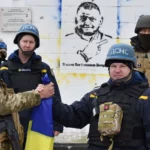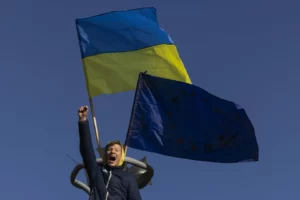Russia has proven that it knows how to be a master of distraction and how to take advantage of ethnic cleavages, bolster hardline nationalist politicians, and complicate the region’s lagging reform agendas.

The Kremlin has demonstrated repeatedly that the Balkans are a conducive environment for punching back against the United States and the European Union (EU). The region’s ample ethnic, political, and social fractures, along with widespread disenchantment with the slow pace of Euro-Atlantic integration, create easy opportunities for Moscow to disrupt the post–Cold War European order.
The Kremlin’s track record includes its longtime refusal to recognize Kosovo’s independence, a brazen coup attempt in Montenegro, support for separatist-minded leaders in Bosnia and Herzegovina, and covert efforts to target arms supplies destined for Ukraine and to sow domestic or interstate political tensions. Despite intense international criticism over its war against Ukraine, the Russian government shows no sign of giving up on such heavy-handed behavior or tried-and-true tactics like the cooptation of corrupt local elites. But as the Ukraine war drags on, Balkan leaders may find it more difficult to sit on the fence or to play Moscow and Brussels off of each other.
Russia has several strategic goals in the region. It seeks to prevent the Western Balkan states of Albania, Bosnia and Herzegovina, Kosovo, Montenegro, North Macedonia, and, most importantly, Serbia from joining the EU. It also wants to stymie the NATO aspirations of the remaining Balkan countries that have not gained membership in the alliance and to disrupt NATO activities in the region. By bolstering grassroots anti-Western sentiment and corrupt vested interests across the Balkans, Moscow makes the region’s governance shortcomings more acute and damages the domestic reforms that are a prerequisite for further integration into Euro-Atlantic economic, political, and security structures.
Moscow has long capitalized on lingering ethnic Serb resentment at the 1999 NATO campaign that led to the establishment of Kosovo as an independent state. Amid frequent flare-ups between Serbia and Kosovo, the large NATO-led peacekeeping force in Kosovo continues to play an essential role in regional stabilization efforts, as this summer’s spike in tensions between ethnic Serbs and Kosovar Albanians over license plates demonstrates. While Moscow was on the sidelines during the recent crisis, inflammatory rhetoric by Russian officials needlessly aggravated the overall level of tension. At the same time, the Kremlin’s self-serving narratives and the support of average Serbs for Vladimir Putin as a counterweight to the West make life complicated for U.S. and EU policymakers. Serbian President Aleksandar Vucic’s relationship with Putin has long been complicated, even though he often panders to pro-Russian domestic sentiment for his own political purposes.
Moscow’s meddling in Bosnia and Herzegovina is an ever-present threat. The Kremlin has long cultivated ties to Milorad Dodik, the leader of one of the country’s two federal entities, Republika Srpska, as well as to the prominent Bosnian Croat politician Dragan Covic, whose behavior undermines the viability of Bosnia and Herzegovina’s complex power-sharing arrangements. Russian support and training have bolstered the transformation of Dodik-led security units in Republika Srpska into a quasi-military force in contravention of the Dayton peace agreement. With less than two weeks before Bosnia and Herzegovina’s October 2, 2022, general election, Putin hosted Dodik in Russia, a signal of support for the Bosnian Serb politician that suggests Moscow still aspires to influence the country’s politics.
Another near-term question in Bosnia and Herzegovina is whether Moscow will support the renewal of the UN mandate for the European Union Peacekeeping Force in Bosnia and Herzegovina, or EUFOR, which expires on November 2, 2022. Russian officials are coy about their plans, but blocking its renewal could ultimately backfire if the Europeans simply decide to go around Russia and extend the mission unilaterally at Sarajevo’s request. Despite the war in Ukraine, the West has not been distracted from the risks of destabilization inside Bosnia and Herzegovina. The EU increased EUFOR’s size from 600 to 1,100 peacekeepers earlier this year, and NATO forces based in Italy also remain prepared to deploy to Bosnia in a supporting role if needed.
Russia’s toolkit is rich in symbolism and instruments of subversion. Yet it has surprisingly few tangible benefits to offer to countries in need of greater stability and prosperity. Instead, Russia’s hand is mostly visible in the intelligence and GRU (military intelligence) operations that it has conducted across the region, including the destruction of arms depots in Bulgaria; a botched surveillance attempt at an Albanian military facility; a possible cyber attack in Montenegro; and large-scale disinformation, propaganda, and political meddling operations. U.S. officials have long put a spotlight on a Russian “humanitarian response” center in Serbia, warning that it may serve as a hub for “espionage or other nefarious activities.” Moscow and Minsk in the past have donated surplus military equipment to Belgrade. In return, Serbia has participated off and on in annual Slavic Brotherhood military exercises with Russia and Belarus. It pulled out of the 2020 exercise under EU pressure in the midst of Minsk’s brutal crackdown against opponents of the Alexander Lukashenko regime only to rejoin it in 2021.
Moscow’s war in Ukraine, however, has introduced tension into the Russian-Serbian bilateral relationship. Belgrade voted in favor of the March 2022 United Nations General Assembly Resolution condemning Russia’s attack on Ukraine. Serb nationalists were dismayed that Moscow cited Kosovo as a precedent for its recognition of the Luhansk and Donetsk separatist entities as independent states. Serbia reportedly has also allowed the UK and France to use its territory as a transshipment point for noncombat military equipment headed to Ukraine.
Russian soft power has enjoyed sporadic success. Russian politicians profess a special affinity for “brotherly” South Slavs and extol ties between the Russian and Serbian Orthodox churches. Far-right nationalist and religious groups are receptive to Moscow’s efforts to promote “traditional values,” as seen most vividly in an August 28 protest in Belgrade against an upcoming pride parade in which some demonstrators hoisted Russian flags and the pro-war “Z” symbol. Vucic responded by canceling the planned parade and warning that Serbia had become the site of an East-West proxy conflict, all of which highlights the challenges he faces in balancing between Russia and the EU.
At the beginning of the pandemic, Russian planes delivered PPE to Serbia, which eventually purchased doses of Russia’s controversial Sputnik V vaccine and launched a local production facility for the vaccine’s well-connected Russian backers. At the same time, Serbia carefully adopted a multi-pronged approach, also making sure to source additional COVID vaccine doses from Chinese and Western suppliers and to develop commercial relationships with American, Chinese, and European pharmaceutical manufacturers.
It is in the economic realm that the puniness of Russia’s footprint is most apparent. All Balkan states depend heavily on Europe for trade and investment, thanks to geographic proximity and overall trade orientation. The EU accounts for 60 percent of Serbia’s external trade, for example. Serbia exported roughly 14 billion euros’ worth of goods to Europe in 2021; by contrast, its 2020 exports to Russia were worth only 911 million euros: 4.7 percent of the country’s total exports. With the exception of Kosovo, Western Balkan countries benefit from EU visa-free regimes, which facilitate travel, as well as labor migration to and remittances from Europe. These connections enhance the EU’s leverage and soft power. Serbia and Montenegro also have become a refuge for thousands of Russian exiles opposed to the war and the internal crackdown on dissent.
EU sanctions on Russian energy exports are likely to shrink Russia’s economic presence in the Balkans significantly, disrupting some of the flows of Russian oil and gas that have long been a mainstay of trade relations with the region. Serbia has ostentatiously resisted EU pressure to join the sanctions regime, which has had a negative impact on NIS, the country’s major oil company. Gazprom Neft until recently held the majority stake, which served as a key symbol of Russian political and economic influence in Serbia. However, Croatia plans to implement EU sanctions that will cut off NIS’s ability to import Russian oil starting in December. Due to fears of other secondary sanctions, Vucic has indicated that he may need to nationalize NIS this fall and sell Gazprom Neft’s remaining stake in the company to another buyer to keep it operational.
Russia’s gas war with the EU has rippled into the Balkans, even though the region’s overall energy dependence on Moscow has long been exaggerated. Serbia secured a three-year contract for deeply discounted Russian gas in May 2022. The deal angered EU members, although implementation is uncertain. Yet the volume of Serbia’s gas imports from Russia is relatively small, accounting for only 3 billion cubic meters (bcm) per year. The overall share of gas in Serbia’s energy mix is less than 15 percent. Bulgaria imported about 3 bcm per year from Russia until Moscow turned off the taps in April 2022. Likewise, the share of gas in its energy consumption is relatively small and on par with Serbia. Greece gets 6 bcm a year of Russian gas, or 30 percent of its gas consumption. Gas accounts for slightly more than a quarter of its overall energy consumption, but Athens plans to open a series of regasification terminals from which Balkan states stand to benefit.
Going forward, Western Balkan countries will likely have to weigh the threat of alienating the EU or the United States against the benefits of marginal gains from purchasing gas supplies from Russia or otherwise doing business as usual with Moscow. The ongoing European energy crisis is being felt across the region’s energy markets. Possible shifts include accelerated efforts to develop cross-border energy swaps, new pipeline interconnectors, cleaner energy projects, and, over the longer-term, increased investment in new LNG terminals, which may allow the region to draw upon supplies from the Caspian and Eastern Mediterranean. The first of these LNG terminals, a floating facility in Greece, is scheduled to become operational in September 2022. If the EU throws its weight behind these diversification efforts, Russia’s energy toolkit in southeastern Europe may not be all it is cracked up to be. Of course, any such changes will require time and massive investment, neither of which is assured.
Still, Russia remains a dangerous actor in the Western Balkans. It has a proven capacity and willingness to play the spoiler in regional reconciliation and integration processes. With Russia’s economic toolkit likely weakening over time, the war in Ukraine could incentivize Moscow to use its more destabilizing tools in the region with the goal of overtaxing the limited bandwidth of EU and U.S. decisionmakers. Russia has proven that it knows how to be a master of distraction and how to take advantage of ethnic cleavages, bolster hardline nationalist politicians, and complicate the region’s lagging reform agendas.
Source: Carneige















